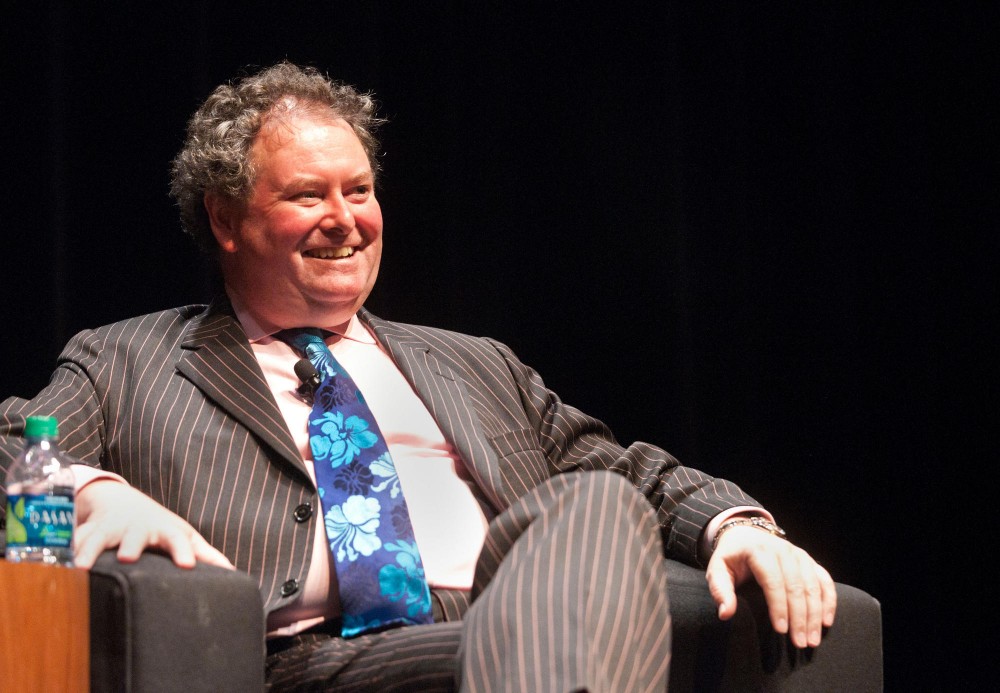Speaking to a large crowd at Coffman Union Theater, Mark Stephens, an internationally renowned lawyer and former counsel for WikiLeaks founder Julian Assange, brought a small part of the WikiLeaks debate to the University of Minnesota on Tuesday night.
Stephens, well-known for defending free speech and expression, spoke about many of the legal dilemmas facing WikiLeaks and its editor Julian Assange, as well as current issues with freedom of speech.
Sparking controversy since its inception in 2007, WikiLeaks became a media sensation after releasing a 17-minute video in April 2010 titled âÄúCollateral Murder,âÄù which showed American soldiers killing two Reuters journalists from an Apache helicopter.
In the months since, the site has also released hundreds of thousands of sensitive government documents, and Assange has become the face of one of the most talked about media organizations in the world.
âÄúThis is a man that people have strong opinions about. Here in America, he may be quite unpopular, but if you go to North Africa and the Middle East, many of the people are intensely grateful to him,âÄù Stephens said.
Some of the U.S. diplomatic cables that WikiLeaks released revealed widespread corruption in the Middle East and helped fuel the development of the Arab Spring, he said.
âÄúIt has been one of the spurs to fundamental change,âÄù Stephens said of AssangeâÄôs organization.
The U.S. government was outraged and suggested it would press charges against Assange for releasing the confidential documents, but no formal charges have been made.
Stephens said thatâÄôs because U.S. prosecutors donâÄôt have a strong enough case.
âÄúThe worst of all possible worlds for the Americans is to have him brought here for a show trial, turn him into a martyr and then have him acquitted. That would be terrible,âÄù Stephens said.
Jane Kirtley, a professor of media ethics and law at the University of Minnesota and StephensâÄô longtime friend, echoed his beliefs and said there are no clear laws on which the prosecution could build a case.
âÄúThey only want to bring cases that theyâÄôre confident they can win, and I think with the existing legal structure, theyâÄôre not confident they can win,âÄù Kirtley said in an interview.
If a case were to move forward, it could have a profound impact on the First Amendment, Kirtley said.
âÄúIt raises really fundamental questions about whether someone who is not subject to any kind of secrecy agreement with the government, like a government employee, can be subject to prosecution. We donâÄôt really know the answer to that question and itâÄôs possible that this case could answer that,âÄù Kirtley said. âÄúI think itâÄôs really difficult to overestimate how significant this case could be if it ever came to that.âÄù
Assange is under house arrest in England and currently fighting extradition to Sweden over a sexual assault investigation. And though he has not been publicly involved with WikiLeaks for some time, he remains a polarizing figure internationally.
Rodrigo Zamith, a University graduate student in journalism, said that while itâÄôs hard to say whether WikiLeaks has had a positive or negative impact, it all depends on the context in which WikiLeaks is viewed.
âÄúI think in the U.S., itâÄôs been bad because it rallies people to support legislation clamping down on whistleblowers and further erosion of the First Amendment, but itâÄôs been wonderful in the Middle East,âÄù Zamith said.

















